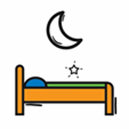Getting enough sleep is important for our physical and mental wellbeing. Getting the right amount of sleep will:
Making sure children and young people get enough sleep helps them keep well, thrive and reach their potential.
Sleep Difficulties
There are many things that get in the way of a good night sleep for children. It could be:
 Life changes and/or worries about things happening in their lives
Life changes and/or worries about things happening in their livesThere are things you can do to help your child get enough rest. Have a look in each of the tabs for ideas of things that can support your child.
Bedtime Worries
Ask your child if anything is worrying them. Give your child time to talk through how they are feeling.
There could be a change they are facing like a new school or a house move. There might have been arguments or a crisis in the family that is upsetting them. They might have friendship worries.
Night Time Fears
Some children go through times when they have bad dreams – this might tie in with worries they have or they may be part of their busy imaginations.
Many children also go through periods where they feel frightened of the dark, ghosts or monsters but this often passes with reassurance and time.
 If your child is having night time fears, try;
If your child is having night time fears, try;
If your child wakes in the night after a bad dream;
Bedtime Routines
Just like babies, as children get older they still benefit from routines to their day. This helps them know what happens and when. Your child will start to recognise the ‘wind down’ time of the day and their body will prepare for sleep.
If your child has not been used to a routine you may have to start slowly. Notice what time they seem to naturally get tired and start your new ‘wind down’ routine about an hour before this.
Once you and your child are used to this, you can gradually shift bedtime to one that suits your family lifestyle and makes sure your child gets enough sleep.
Food & Drink Near Bedtime
Eating and drinking too much or not enough before bed can affect sleep.
Let your child have a drink of water nearby in case they need it in the night.
The Bedroom
Having a restful bedroom can help your child settle to sleep. Whilst it can be trickier if children share a room, making it a place they like to be without distractions like screens or noisy toys will help.
Teenagers
As your child reaches their teens you will notice a change in their sleep patterns. Puberty and a huge period of brain development are happening.
The sleep hormone (called melatonin) gets released later at night in teenagers (about 10pm for adults and about 1am for teenagers). This means teenagers often go to sleep later and want to get up later too. It is a biological change and they cannot help it. Unfortunately it does not always fit in with school and family life.
It can be the cause of a lot of arguments as parents try to get teenagers to get up on time or settle down at a reasonable bedtime.
Children & Young People With Additional Needs
If your child has additional needs it can be even harder to get them into good sleep patterns. This can be very tiring and stressful for the whole family.
If your child is 12 months or older, you can contact the National Sleep Helpline on 03303 530541 for support and advice. This is available Sunday - Thursday 7pm - 9pm. The helpline is run by a team of specialist trained sleep advisors. Although they cannot give medical advice, they can talk through your issues, offer you some practical strategies and recommend services that could help.
You can contact the Healthy Child Programme by calling Just One Number on 0300 300 0123 or texting Parentline on 07520 631590. Our opening hours are 8am-6pm Monday-Friday (excluding bank holidays) and 9am-1pm on Saturdays.
If you are 11-19 you can text ChatHealth on 07480 635060 for confidential advice from one of our team.
Alternatively you can go to see your GP to discuss concerns.
To speak to other Norfolk parents and carers, you can join our online community forum below.